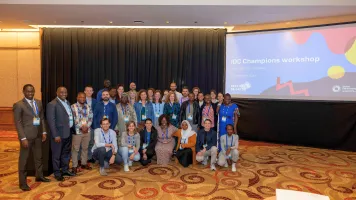This piece is part of a Global Disability Summit blog series from Inclusive Data Charter Champions
Global disability data collection has progressed considerably in recent years. However, in a world increasingly awash with data, too many countries still have poor disability data, and persons with disabilities remain hidden due to the lack of data.
That is why Leonard Cheshire has produced a report launching at the Global Disability Summit, ‘Why Disability Data Matters’. The report shows why it is essential that everyone has access to high-quality disability data and spotlights key data initiatives achieved by Leonard Cheshire within each of the Global Disability Summit 2022 thematic areas. It seeks to highlight the meaningful actions and commitments needed to advance inclusive and disaggregated data at the Global Disability Summit.
Finally, this report showcases best practice examples of data generated by youth and Organizations for Persons with Disabilities (OPDs), engagement with government ministries to support the production of disability data, and the value of high-quality disability data in international development programme settings.
Why disability data matters
No one should be invisible. But the voices of persons with disabilities are often missing. Until recently, systemic collection and analysis of statistics related to persons with disabilities has been largely overlooked, making it much harder for disability rights advocates, Governments, International Development Partners and Agencies to identify and highlight inequalities. That is why in 2018 Leonard Cheshire created our ‘Disability Data Portal’. Through this Portal, persons with disabilities can be empowered to use this data to monitor and demand changes within their countries.
The Disability Data Portal leads the way in synthesizing high-quality data to reflect the realities of persons with disabilities across the world, and to inform future policy and development reforms. While the quantitative data disaggregated by disability severity on the Portal shows us one side of the story, we also believe that data generated by OPDs, and citizen-reporting, is fundamental in understanding the rights of persons with disabilities. These stories and experiences are captured on the Disability Data Portal and have informed government and NGO efforts to sustainably improve the lives of persons with disabilities.
Action needed at the Global Disability Summit
Today marks the official start of the second Global Disability Summit. It is vital that policy makers seize this opportunity to send a strong signal that they are committed to the rights of persons with disabilities to be counted – an essential aspect of fulfilling the goals of an inclusive society.
Based on this report’s findings, Leonard Cheshire urges policy makers to adopt the following meaningful actions and commitments needed to advance inclusive and disaggregated data at the Global Disability Summit:
Calls to action
National governments:
- Commit to using Washington Group questions in all surveys and censuses and increase the availability of internationally comparable data on disability from all key development indicators, including those drawn from the UN Sustainable Development Goals framework.
- Strengthen statistical capacity in-country to measure and incorporate disability into national statistical systems.
- Commit to sharing national census microdata to ensure the public availability of datasets disaggregated by disability.
International development partners and UN agencies:
- Increase funding by bilateral and multilateral development partners, including philanthropic foundations, for the collection, analysis, and dissemination of data on disability.
- Increase commitments to and capacity of humanitarian agencies to capture data on persons with disabilities, including through adaptations to donor reporting requirements.
- Ensure programmes and policies capture disability data in line with the Washington Group Questions.
- Provide financial and technical support for the development of further Washington Group Question resources for NGOs and promote good practice examples in the use of the data this produces.
Inclusive Data Charter commitment
In addition to supporting improved quality and increased access to data on disability, Leonard Cheshire is also contributing to the global debate on how to capture data on disability using evidence from our long-term experience in the field of disability data research and policy.
Leonard Cheshire is committed to becoming an Inclusive Data Charter Champion, to catalyze broader action on inclusive disability data. Leonard Cheshire will be working closely with the Inclusive Data Charter to formalize this commitment and develop an action plan to achieve this.
Visit the Leonard Cheshire’s Disability Data Portal.


